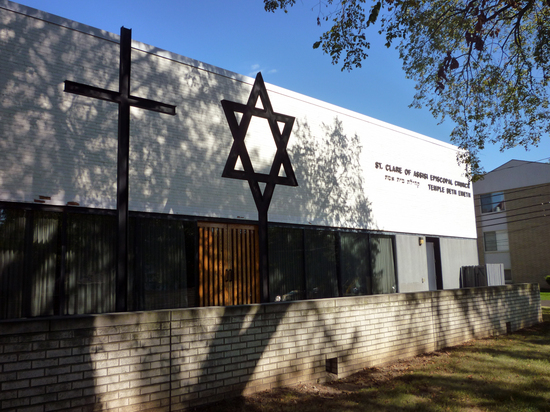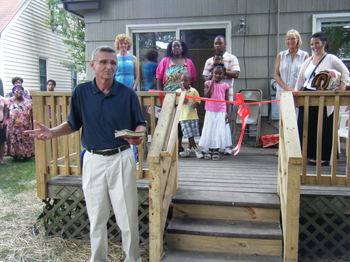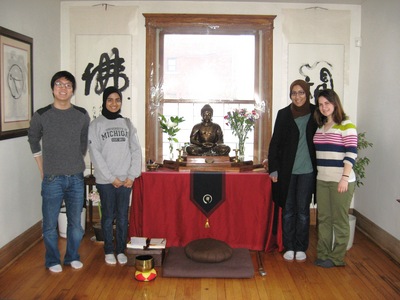Ann Arbor's many interfaith groups set solid example for interfaith dialogue, tolerance and understanding

The Christian Cross and Jewish Star of David stand together in front of Genesis of Ann Arbor at 2309 Packard St. The worship space is co-owned by St. Clare's Episcopal Church and Jewish reform Temple Beth Emeth.
Katherine Axelsen | AnnArbor.com
Ann Arbor is known for its liberal attitude and progressive community, but what truly amazes me is its commitment and approach to interfaith activities — undoubtedly influenced by the University of Michigan.
Not all liberal and progressive cities have as vigorous a level of interfaith activity as Ann Arbor. My hometown of Philadelphia, for example, is home to many religious identities, but they tend to remain distinct from each other and separate. They coexist peacefully, and even celebrate their diversity, but relatively few attempts are made to build bridges of understanding between different faiths.
Furthermore, I think there is an important difference between celebrating the diversity of faiths and trying to understand their differences.
Religion is a fundamental motivator for large groups of people and a primary determinant of their worldview. Left to learning from second-hand sources about how other people view the world, we are bound to have an incomplete, inaccurate and even dangerous understanding of them.
Moreover, when someone chooses to follow a religion, she is implicitly declaring that all religions are not true and that not all have equal validity. This would be a formula for irresolvable conflict if a community did not place a high value on the freedom of its individuals to explore different religious options.
Huston Smith, a well-known 20th century religion scholar, proposed that all religions lead to the same goal, or "Godthink," in his book, “The World’s Religions: Our Great Wisdom Traditions.” He compared life to a mountain with many paths leading to the top. Each of the world’s religions is a different path, but when they get to the top, they all become one.
This view is strongly criticized by Stephen Prothero, a member of the Department of Religion at Boston University, in his novel, "God Is Not One: The Eight Rival Religions That Run the World — and Why Their Differences Matter." Prothero blames Godthink for making our country "allergic to argument" and claims that Smith’s metaphor is "dangerous, disrespectful and untrue." He believes that "the ideal of religious tolerance has morphed into the straightjacket of religious agreement."
I believe another danger exists when “the ideal of religious tolerance” morphs into a straightjacket of religious indifference — when religious diversity is tolerated, but not understood.

Ron Gelaude, the pastor at Connexions, speaking at the dedication of the 2010 Interfaith Build of Habitat for Humanity. Background: Gwynn Sterken, Family Support Partner, Sharmaine (mother), Correlle Jr. Sharelle, Daniel and Correlle (father), Lynne Punnett, Construction Manager, and Sarah Stanton, Executive Director.
Photo courtesy of Habitat for Humanity
How has Ann Arbor escaped this straightjacket?
I don't believe Ann Arbor practices Godthink. Instead, residents of Ann Arbor strive to identify commonalities and differences among religions.
For example, Ann Arbor's Saint Clare of Assisi Episcopal Church has co-owned its worship center at 2309 Packard St. with the reform Jewish Temple Beth Emeth since 1974 under the name of Genesis of Ann Arbor.
It is impossible for these congregations to simply tolerate each other. Because they share the same building, they must work together, eat together and even pray together. Lead Pastor of Saint Clare, the Rev. James Rhodenhiser, believes this close relationship with Temple Beth Emeth does not compromise his Christian lifestyle but rather "helps [him] to see [his] own faith with new eyes."
"When you sit down with people of different faiths in an atmosphere of respect, you find understanding and God being revealed in new ways," Rhodenhiser said. "We believe that each of us can be betters Jews and better Christians by working with each other."
Another example is Zeitouna, a dialogue group founded in 2002 by Laurie White, a member of Temple Beth Emeth, and 12 women from Ann Arbor.
Consisting of mostly Jews and Muslims, these ladies tackle discussion of conflict in the Middle East as it affects their lives in Ann Arbor. The main goal of the dialogue is to "turn down the volume on fear, see things in a much more positive light," said White. “It has been our experience that when you get to know a person in a safe place you find that you have much more in common."
Since the group was founded, it has helped start two other women’s dialogue groups and one men’s group in Ann Arbor.
Another example is the University of Michigan’s Ginsberg Center for community service. In 2008 this center created Interfaith Action, a community service program specifically designed to facilitate interfaith activities.

Interfaith Action Alternative Spring Break Members (from left) Ken Lee, Misbah Ahmed, Afshan Khan, and Lexie Tourek at Stillpoint Zen Buddhist Temple in Detroit, MI.
Photo courtesy of Rachel Freedman-Doan | AnnArbor.com
Habitat for Humanity of Huron Valley has also made a conscious decision to focus on interfaith activities. For the past decade Habitat for Humanity’s local affiliate in Ann Arbor has promoted at least one interfaith build project each year where congregations of churches, synagogues and temples build a house together.
“Working together on a project like an Interfaith Build is a great way to overcome tensions and to build and strengthen community, both for Ann Arbor and Washtenaw County as a whole, and for the individual participants who come out and work side-by-side with someone of another faith” said Maggie Porter, Habitat for Humanity of Huron Valley’s Faith Relations Associate.
Other interfaith organizations in Ann Arbor include: the Interfaith Hospitality Network of Washtenaw County at Alpha House, the Interfaith Round Table of Washtenaw County, the Interfaith Council for Peace and Justice and the Program on Intergroup Relations at U-M.
I am not exalting Ann Arbor to be the perfect example and balance of interfaith relations — but I do believe that Ann Arbor has a active commitment to interfaith activities and an approach that is not only tolerant, but also welcoming, of diversity.
Katherine Axelsen is a senior at the University of Michigan majoring in English & Comparative Religion. Contact her at kaxe@umich.edu.


Comments
indigonation
Sat, Sep 25, 2010 : 9:17 p.m.
As a spiritual Satanist I am glad that people in the community are working on interfaith understanding, and thats why I moved to Ann Arbor, I feel I can be more open here, yet I don't hate people of different beliefs and I work to learn about and understand faiths like Christianity, Buddhism, Hinduism etc and I love religious diversity. I believe that we are all free to choose our own path and that my path isn't for everyone. Basically I believe in the ancient pagan gods and believe that Satan was one of them who is greatly misunderstood and wanted to help free humanity. Anyways its good to see that Ann Arbor is known as such a great place it makes me proud to live here.
a2red
Thu, Sep 23, 2010 : 11:20 a.m.
Great article, and I'm glad to see there is so much going on in the interfaith world in Ann Arbor. One thing though- it is the "Ginsberg Center," and not "Ginsburg." Thanks! -Rachel
B Crump
Thu, Sep 23, 2010 : 9:13 a.m.
Nice! As an advocate of a wholesale boycott of religion, I acknowledge that my vision is flawed. Religion may very well prove to be wired into the very DNA of humankind. I like your take on the subject because it advocates a broad-based assessment and understanding necessitated by tolerance, understanding, and respect we are lacking within religious communities. I sense that you are discussing a respect of religion but not the worship of it...maybe that's more of my gripe.